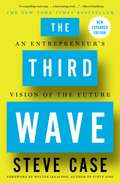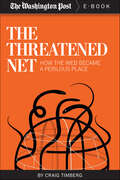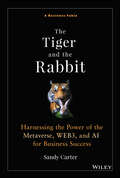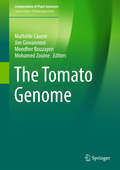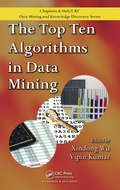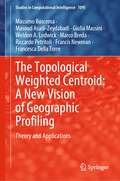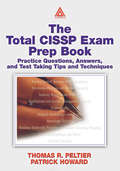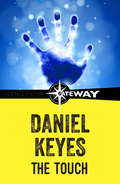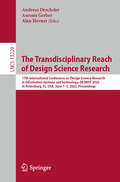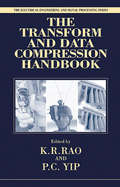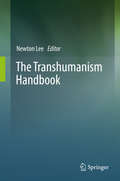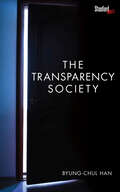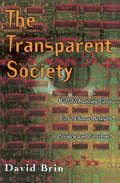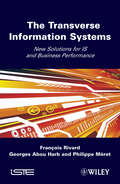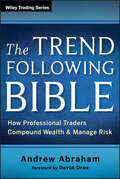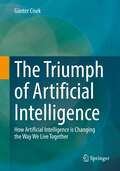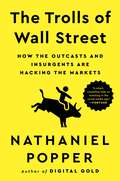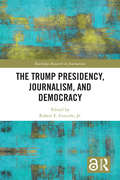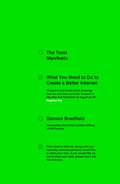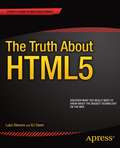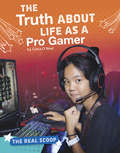- Table View
- List View
The Third Wave: An Entrepreneur's Vision of the Future
by Steve Case<P> One of America's most accomplished entrepreneurs--a pioneer who made the Internet part of everyday life and orchestrated the largest merger in the history of business--shares a roadmap for how anyone can succeed in a world of rapidly changing technology. <P>Steve Case's career began when he cofounded America Online (AOL) in 1985. At the time, only three percent of Americans were online. It took a decade for AOL to achieve mainstream success, and there were many near-death experiences and back-to-the-wall pivots. AOL became the top performing company of the 1990s, and at its peak more than half of all consumer Internet traffic in the United States ran through the service. After Case engineered AOL's merger with Time Warner and he became Chairman of the combined business, Case oversaw the biggest media and communications empire in the world. <P>In The Third Wave, which pays homage to the work of the futurist Alvin Toffler (from whom Case has borrowed the title, and whose work inspired him as a young man), Case takes us behind the scenes of some of the most consequential and riveting business decisions of our time while offering illuminating insights from decades of working as an entrepreneur, an investor, a philanthropist, and an advocate for sensible bipartisan policies. We are entering, as Case explains, a new paradigm called the "Third Wave" of the Internet. The first wave saw AOL and other companies lay the foundation for consumers to connect to the Internet. <P>The second wave saw companies like Google and Facebook build on top of the Internet to create search and social networking capabilities, while apps like Snapchat and Instagram leverage the smartphone revolution. Now, Case argues, we're entering the Third Wave: a period in which entrepreneurs will vastly transform major "real world" sectors like health, education, transportation, energy, and food--and in the process change the way we live our daily lives. But success in the Third Wave will require a different skill set, and Case outlines the path forward. <P>The Third Wave is part memoir, part manifesto, and part playbook for the future. With passion and clarity, Case explains the ways in which newly emerging technology companies (a growing number of which, he argues, will not be based in Silicon Valley) will have to rethink their relationships with customers, with competitors, and with governments; and offers advice for how entrepreneurs can make winning business decisions and strategies--and how all of us can make sense of this changing digital age. <P><b>A New York Times Bestseller</b>
The Threatened Net: How the Web Became a Perilous Place
by Craig Timberg The Washington PostThe Internet can appear to be elegantly designed, but as The Washington Post’s Craig Timberg demonstrated in his illuminating series “Net of Insecurity,” the network is much more an assemblage of kludges—more Frankenstein than Ferrari—that endure because they work, or at least work well enough. The defects hackers use often are well-known and ancient in technological terms, surviving only because of an industry-wide penchant for patching over problems rather than replacing the rot – and because Washington largely shrugged. At critical moments in the development of the Internet, some of the country’s smartest minds warned leaders at the Pentagon and in Congress, but were largely ignored. The consequences now play out across cyberspace every second of every day, as hackers exploit old, poorly protected systems to scam, steal, and spy on a scale never before possible. Today, hundreds of billions of dollars are spent on computer security and the danger posed by hackers seems to grow worse each year, threatening banks, retailers, government agencies, a Hollywood studio and, experts worry, critical mechanical systems in dams, power plants, and aircraft. Many have tried to write about the origins of the Internet. But never before has a writer so thoroughly elucidated the history of the security of the Internet—and why basic flaws in its design continue to leave this country wide open to digital threats.
The Tiger and the Rabbit: Harnessing the Power of the Metaverse, WEB3, and AI for Business Success
by Sandy CarterUnlock the potential of the world’s latest tech to solve your customers’ most pressing problems In The Tiger and The Rabbit: Harnessing the Power of the Metaverse, Web3, and AI for Business Success, A Business Fable, former Amazon Web Services VP and COO and Channel Chief at Unstoppable Domains, Sandy Carter, delivers an engaging new narrative about a brand struggling to improve their customer experience. The company’s technical and marketing teams must work together to present solutions involving Web3, the Metaverse and Artificial Intelligence, in doing so, they learn valuable lessons about digital identity, community, and data ownership. In the book, you’ll find: Strategies for combining technologies, like artificial intelligence and blockchain, to unlock previously unheard-of solutions to contemporary problems Explorations of the Metaverse’s potential for new experiences The role of community in non-fungible token technology and what it means for the future of digital identity An indispensable and exciting discussion of using the world’s newest technologies to solve some of our customers’ most intractable problems, The Tiger and The Rabbit will earn a place on the bookshelves of managers, executives, entrepreneurs, founders, board members, and other business leaders.
The Tomato Genome
by Mathilde Causse Mondher Bouzayen Jim Giovannoni Mohamed ZouineThis book describes the strategy used for sequencing, assembling and annotating the tomato genome and presents the main characteristics of this sequence with a special focus on repeated sequences and the ancestral polyploidy events. It also includes the chloroplast and mitochondrial genomes. Tomato (Solanum lycopersicum) is a major crop plant as well as a model for fruit development, and the availability of the genome sequence has completely changed the paradigm of the species' genetics and genomics. The book describes the numerous genetic and genomic resources available, the identified genes and quantitative trait locus (QTL) identified, as well as the strong synteny across Solanaceae species. Lastly, it discusses the consequences of the availability of a high-quality genome sequence of the cultivated species for the research community. It is a valuable resource for students and researchers interested in the genetics and genomics of tomato and Solanaceae.
The Top Ten Algorithms in Data Mining (Chapman & Hall/CRC Data Mining and Knowledge Discovery Series)
by Vipin Kumar Xindong WuIdentifying some of the most influential algorithms that are widely used in the data mining community, The Top Ten Algorithms in Data Mining provides a description of each algorithm, discusses its impact, and reviews current and future research. Thoroughly evaluated by independent reviewers, each chapter focuses on a particular algorithm and is wri
The Topological Weighted Centroid: Theory and Applications (Studies in Computational Intelligence #1095)
by Massimo Buscema Weldon A. Lodwick Giulia Massini Marco Breda Francis Newman Masoud Asadi-Zeydabadi Riccardo Petritoli Francesca Della TorreThis book introduces the Topological Weighed Centroid approach and describes some applications in the study of the dynamics of various spatial phenomena with a special emphasis on the spatial analysis of the relationship, influence, and dynamics of geographical phenomena. Offering a comprehensive introduction to the theory and illustrative examples from various kinds of geographical data, this book also takes an in-depth look at more complex case studies, such as the applications of the topological weighed centroid approach in the study of epidemic patterns, cultural processes, criminality, and environmental phenomena.
The Total CISSP Exam Prep Book: Practice Questions, Answers, and Test Taking Tips and Techniques
by Patrick D. Howard Thomas R. Peltier Bob CartwrightWritten by a team of subject matter experts, many of them CISSP exam prep course instructors, this book is primarily a test prep book, not a study guide. Its goal is to help people pass the test. It discusses successful approaches for the exam, provides sample questions and test-taking tips, and contains an annotated bibliography section that provides advice on helpful references for a given domain. With access to two complete 250-question sample exams, The Total CISSP Exam Prep Book provides readers with a full flavor of what it will take to pass the exam.
The Touch
by Daniel KeyesThe ultimate 'what if' novel, from the million-copy-bestselling author of FLOWERS FOR ALGERNON: 'A masterpiece of poignant brilliance ... heartbreaking' GuardianKaren and Barney Stark should never have married. Childless, uncomfortable and incompatible, their marriage has not been a success, and the lack of a child only makes the tension between them worse. And living their lives to the beat of a fertility clock only adds to the increasingly volatile atmosphere.When an incident at Barney's workplace causes them both to be unknowingly contaminated with radioactive dust, they also become pariahs - in their neighbourhood and with their families. But things are only going to get worse. Karen discovers she is pregnant and as their closest friends become frightened enemies, the dream of becoming parents turns into a nightmare...
The Toxic Meritocracy of Video Games: Why Gaming Culture Is the Worst
by Christopher A. PaulAn avid gamer and sharp media critic explains meritocracy&’s negative contribution to video game culture—and what can be done about it Video games have brought entertainment, education, and innovation to millions, but gaming also has its dark sides. From the deep-bred misogyny epitomized by GamerGate to the endemic malice of abusive player communities, gamer culture has had serious real-world repercussions, ranging from death threats to sexist industry practices and racist condemnations. In The Toxic Meritocracy of Video Games, new media critic and longtime gamer Christopher A. Paul explains how video games&’ focus on meritocracy empowers this negative culture. Paul first shows why meritocracy is integral to video-game design, narratives, and values. Games typically valorize skill and technique, and common video-game practices (such as leveling) build meritocratic thinking into the most basic premises. Video games are often assumed to have an even playing field, but they facilitate skill transfer from game to game, allowing certain players a built-in advantage.The Toxic Meritocracy of Video Games identifies deep-seated challenges in the culture of video games—but all is not lost. As Paul argues, similarly meritocratic institutions like professional sports and higher education have found powerful remedies to alleviate their own toxic cultures, including active recruiting and strategies that promote values such as contingency, luck, and serendipity. These can be brought to the gamer universe, Paul contends, ultimately fostering a more diverse, accepting, and self-reflective culture that is not only good for gamers but good for video games as well.
The Transdisciplinary Reach of Design Science Research: 17th International Conference on Design Science Research in Information Systems and Technology, DESRIST 2022, St Petersburg, FL, USA, June 1–3, 2022, Proceedings (Lecture Notes in Computer Science #13229)
by Alan Hevner Aurona Gerber Andreas DrechslerThis book constitutes the thoroughly refereed proceedings of the 17th International Conference on Design Science Research in Information Systems and Technology, DESRIST 2022, held in Tampa, FL, USA, in June 2022. The 37 revised full research papers, included in the volume were carefully reviewed and selected from 103 submissions. They are organized in the following topical sections: Transdisciplinary Research & DSR (theme Track); Blockchain Information Systems; Intelligent Systems and Human Interaction; Healthcare Systems and Quality of Life; Innovation and Entrepreneurship; Sustainability and Responsible Design (Environmental Issues, Human Values and ethical Design); Human Safety and Cybersecurity; Emerging DSR Methods and Processes; Designers and Collaborative DSR; and Education and DSR.
The Transform and Data Compression Handbook (Electrical Engineering & Applied Signal Processing Series)
by K. R. Rao P. C. YipData compression is one of the main contributing factors in the explosive growth in information technology. Without it, a number of consumer and commercial products, such as DVD, videophone, digital camera, MP3, video-streaming and wireless PCS, would have been virtually impossible. Transforming the data to a frequency or other domain enables even more efficient compression. By illustrating this intimate link, The Transform and Data Compression Handbook serves as a much-needed handbook for a wide range of researchers and engineers.The authors describe various discrete transforms and their applications in different disciplines. They cover techniques, such as adaptive quantization and entropy coding, that result in significant reduction in bit rates when applied to the transform coefficients. With clear and concise presentations of the ideas and concepts, as well as detailed descriptions of the algorithms, the authors provide important insight into the applications and their limitations. Data compression is an essential step towards the efficient storage and transmission of information. The Transform and Data Compression Handbook provides a wealth of information regarding different discrete transforms and demonstrates their power and practicality in data compression.
The Transhumanism Handbook
by Newton LeeModern humanity with some 5,000 years of recorded history has been experiencing growing pains, with no end in sight. It is high time for humanity to grow up and to transcend itself by embracing transhumanism. Transhumanism offers the most inclusive ideology for all ethnicities and races, the religious and the atheists, conservatives and liberals, the young and the old regardless of socioeconomic status, gender identity, or any other individual qualities. This book expounds on contemporary views and practical advice from more than 70 transhumanists. Astronaut Neil Armstrong said on the Apollo 11 moon landing in 1969, “One small step for a man, one giant leap for mankind.” Transhumanism is the next logical step in the evolution of humankind, and it is the existential solution to the long-term survival of the human race.
The Transparency Society
by translated by Erik Butler Byung-Chul HanTransparency is the order of the day. It is a term, a slogan, that dominates public discourse about corruption and freedom of information. Considered crucial to democracy, it touches our political and economic lives as well as our private lives. Anyone can obtain information about anything. Everything--and everyone--has become transparent: unveiled or exposed by the apparatuses that exert a kind of collective control over the post-capitalist world. For transparency has a dark side that, ironically, it has everything to do with a lack of mystery, shadow, and nuance. Behind the apparent accessibility of knowledge lies the disappearance of privacy, homogenization, and the collapse of trust. The anxiety to accumulate ever more information does not necessarily produce more knowledge or faith. Technology creates the illusion of total containment and constant monitoring of information, but what we lack is adequate interpretation of the information. In this manifesto, Byung-Chul Han denounces transparency as a false ideal, the strongest and most pernicious of our contemporary mythologies.
The Transparent Society: Will Technology Force Us To Choose Between Privacy And Freedom?
by David BrinIn New York and Baltimore, police cameras scan public areas twenty-four hours a day. Huge commercial databases track you finances and sell that information to anyone willing to pay. Host sites on the World Wide Web record every page you view, and "smart" toll roads know where you drive. Every day, new technology nibbles at our privacy.Does that make you nervous? David Brin is worried, but not just about privacy. He fears that society will overreact to these technologies by restricting the flow of information, frantically enforcing a reign of secrecy. Such measures, he warns, won't really preserve our privacy. Governments, the wealthy, criminals, and the techno-elite will still find ways to watch us. But we'll have fewer ways to watch them. We'll lose the key to a free society: accountability.The Transparent Society is a call for "reciprocal transparency." If police cameras watch us, shouldn't we be able to watch police stations? If credit bureaus sell our data, shouldn't we know who buys it? Rather than cling to an illusion of anonymity-a historical anomaly, given our origins in close-knit villages-we should focus on guarding the most important forms of privacy and preserving mutual accountability. The biggest threat to our freedom, Brin warns, is that surveillance technology will be used by too few people, now by too many.A society of glass houses may seem too fragile. Fearing technology-aided crime, governments seek to restrict online anonymity; fearing technology-aided tyranny, citizens call for encrypting all data. Brins shows how, contrary to both approaches, windows offer us much better protection than walls; after all, the strongest deterrent against snooping has always been the fear of being spotted. Furthermore, Brin argues, Western culture now encourages eccentricity-we're programmed to rebel! That gives our society a natural protection against error and wrong-doing, like a body's immune system. But "social T-cells" need openness to spot trouble and get the word out. The Transparent Society is full of such provocative and far-reaching analysis.The inescapable rush of technology is forcing us to make new choices about how we want to live. This daring book reminds us that an open society is more robust and flexible than one where secrecy reigns. In an era of gnat-sized cameras, universal databases, and clothes-penetrating radar, it will be more vital than ever for us to be able to watch the watchers. With reciprocal transparency we can detect dangers early and expose wrong-doers. We can gauge the credibility of pundits and politicians. We can share technological advances and news. But all of these benefits depend on the free, two-way flow of information.
The Transverse Information System: New Solutions for IS and Business Performance
by Philippe Meret Georges Abou Harb Francois RivardInformation systems have an enormous potential for improving business performance. With this in mind, companies must set out to exploit and optimize this potential without delay in order to improve their efficiency and continue to set themselves apart from the competition. This comprehensive text provides the information needed to understand and implement these systems at a practical level.
The Trend Following Bible
by Andrew Abraham David DruzA proven approach to trading success based on the best commodity trading advisorsProfiting from long-term trends is the most common path to success for traders. The challenge is recognizing the emergence of a trend and determining where to enter and exit the market. The Trend Following Bible shows individual traders and investors how to profit from this approach by trading like today's top commodity trading advisors.In this book, author Andrew Abraham stresses the importance of a disciplined, consistent methodology, with stringent risk controls, that allows you to catch big trends, while limiting losses on unprofitable trades. By trading in this manner, he shows you how to successfully achieve market-beating returns over the long term and multiple your trading capital along the way.Reveals exactly how top commodity trading advisors operate and how individuals can incorporate these methods into their everyday trading endeavorsAddresses key issues like position sizing and risk control, which are critical to trading success, but often underemphasized in other trading literatureHighlights how to effectively execute the trading strategies outlinedEngaging and accessible, The Trend Following Bible will put you in a better position to profit as you make more informed trading decisions.
The Trillion-Dollar Conspiracy: How the New World Order, Man-Made Diseases, and Zombie Banks Are Destroying America
by Jim Marrs“Jim Marrs can’t be ignored. Few in this country shout about The Truth louder than he.”—Dallas ObserverIn The Trillion-Dollar Conspiracy, Jim Marrs, the New York Times bestselling author of Rule by Secrecy and The Rise of The Fourth Reich, offers a terrifying proposition: that the current economic collapse has been engineered by a tyrannous government and multinational corporations determined to enslave us. Read The Trillion-Dollar Conspiracy and find out how the New World Order, man-made diseases, and zombie banks are destroying America.
The Triumph of Artificial Intelligence: How Artificial Intelligence is Changing the Way We Live Together
by Günter CisekThe book demonstrates to readers interested in social life in an understandable way how AI works and how it will dramatically change all areas of life. From the history of AI to its techniques and its diverse fields of application to its ethical-philosophical implications, all relevant aspects are presented in detail. The author does not remain descriptive, but also takes a critical stance on AI development in clear words. For the reader, the explanations are designed as a professional support corset, in order to be able to act as a knowledgeable counterpart to the AI experts. The last two chapters take the reader into the future of life with super AI. With daring scenarios, the author alerts the reader in an enjoyable way to the breathtaking and socially highly explosive perspectives associated with AI and the ethical and philosophical questions that arise from it.This book is a translation of the original German 1st edition Machtwechsel der Intelligenzen by Günter Cisek, published by Springer Fachmedien Wiesbaden GmbH, part of Springer Nature in 2021. The translation was done with the help of artificial intelligence (machine translation by the service DeepL.com). A subsequent human revision was done primarily in terms of content, so that the book will read stylistically differently from a conventional translation. Springer Nature works continuously to further the development of tools for the production of books and on the related technologies to support the authors.
The Trolls of Wall Street: How the Outcasts and Insurgents Are Hacking the Markets
by Nathaniel PopperThe dramatic story of an improbable gang of self-proclaimed “degenerates” who made WallStreetBets into a cultural movement that moved from the fringes of the internet to the center of Wall Street, upending the global financial markets and changing how an entire generation thinks about money, investing, and themselves. Jaime Rogozinski and Jordan Zazzara were not what anyone would mistake for traditional financial power players. But they turned WallStreetBets, a subreddit focused on risky financial trading, into one of the most disruptive forces to bubble up from the fringes of the internet. This crude and unassuming message board harnessed the power of memes and trolling to create a new kind of online community. The group intertwined with the distrust and turmoil of our times and spoke to a generation of young men who were struggling to find their place in the world. Deeply reported and fast moving, The Trolls of Wall Street is the suspenseful story of the people who made and lost millions, battling with each other—and with Wall Street—for power and status. It is a sobering account of how millions of young Americans became obsessed with money and the markets, casting a long and lasting influence over finance, politics, and popular culture.
The Trump Presidency, Journalism, and Democracy (Routledge Research in Journalism)
by Robert E. Gutsche Jr.This book examines the disruptive nature of Trump news – both the news his administration makes and the coverage of it – related to dominant paradigms and ideologies of U.S. journalism. By relying on conceptualizations of media memory and "othering" through news coverage that enhances socio-conservative positions on issues such as immigration, the book positions this moment in a time of contestation. Contributors ranging from scholars, professionals, and media critics operate in unison to analyze today’s interconnected challenges to traditional practices within media spheres posed by Trump news. The outcomes should resonate with citizens who rely on journalism for civic engagement and who are active in social change
The Trust Manifesto: What you Need to do to Create a Better Internet
by Damian BradfieldFrom the moment we wake up and unlock our phones, we're producing data. We offer up our unique fingerprint to the online world, scan our route to work, listen to a guided meditation or favourite playlist, slide money around, share documents and update our social media accounts. We reach for our phones up to 200 times a day, not knowing which companies are storing, using, selling and manipulating our data. But do we care? We're busy. We've got lives. We're pressed for time! There aren't enough hours in the day to read the terms and conditions. Or, maybe we're happy to trade our personal data for convenient services and to make our lives easier?Big data is the phenomenon of our age, but should we trust it without question? This is the trust dilemma.In 2009, Damian Bradfield founded WeTransfer, the largest file-sharing platform in the world with 50 million global users shipping more than one billion files of data a month. His unique experience of the big data economy has led him to question if there is another way to build the internet, one that is fairer and safer for everyone and, in The Trust Manifesto, he lays out this vision.
The Truth About HTML5
by Luke Stevens Rj OwenThe Truth About HTML5 is for web designers, web developers, and front-end coders who want to get up to speed with HTML5. The book isn't afraid to point out what everyone gets wrong about HTML5's new markup, so you donOCOt make the same mistakes. It will show you what rocks in HTML5 today and what the future holds. Marking up a basic web page shouldn't be a quasi-religious exercise where the high priests of HTML5 must be consulted for their interpretation of the holy texts (the HTML5 spec). DonOCOt waste hours trawling through confusing, poorly researched, and often flat-out wrong information on the Internet. Get the truth on HTML5's markup here. You'll also find out about HTML5's new microdata standard that's being used on major websites, such as eBay and IMDB, right now, and get the low-down on the Canvas object and what it can and can't do for you. The book also covers how HTML5 affects CMSs and web apps, what HTML5 means for mobile, and what the future holds. HTML5 isn't one big blob of technology that will be 'finished' at some point in the future. ItOCOs a grab bag of cool stuff, much of which has been around for years. Learn whatOCOs well supported and ready to go today. Now that the initial wave of hype is over, it's time to learn the truth about HTML5. "
The Truth About Life as a Pro Gamer (The Real Scoop)
by Ciara O'NealHow does someone become a pro gamer? What do pro gamers do? Learn about how pro gamers compete, train, and more!
The Truth About Life as a YouTube Star (The Real Scoop)
by Sarah CordsHow does someone become a YouTube star? What do YouTube stars do? Learn about how YouTube stars make videos, talk to fans, and more!
The Tuning of Place: Sociable Spaces and Pervasive Digital Media (The\mit Press Ser.)
by Richard CoyneHow pervasive digital devices—smartphones, iPods, GPS navigation systems, and their networks—us formulate a sense of place and refine social relationshipsHow do pervasive digital devices—smartphones, iPods, GPS navigation systems, and cameras, among others—influence the way we use spaces? In The Tuning of Place, Richard Coyne argues that these ubiquitous devices and the networks that support them become the means of making incremental adjustments within spaces—of tuning place. Pervasive media help us formulate a sense of place, writes Coyne, through their capacity to introduce small changes, in the same way that tuning a musical instrument invokes the subtle process of recalibration. Places are inhabited spaces, populated by people, their concerns, memories, stories, conversations, encounters, and artifacts. The tuning of place—whereby people use their devices in their interactions with one another—is also a tuning of social relations.The range of ubiquity is vast—from the familiar phones and hand-held devices through RFID tags, smart badges, dynamic signage, microprocessors in cars and kitchen appliances, wearable computing, and prosthetics, to devices still in development. Rather than catalog achievements and predictions, Coyne offers a theoretical framework for discussing pervasive media that can inform developers, designers, and users as they contemplate interventions into the environment. Processes of tuning can lead to consideration of themes highly relevant to pervasive computing: intervention, calibration, wedges, habits, rhythm, tags, taps, tactics, thresholds, aggregation, noise, and interference.
